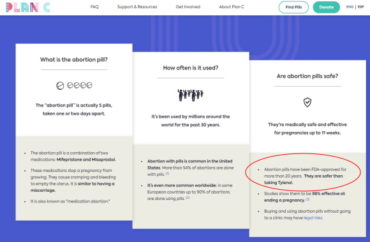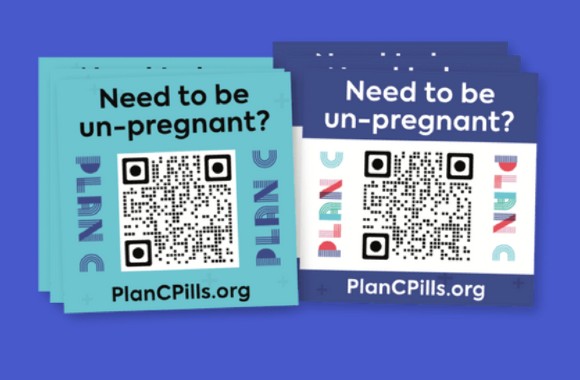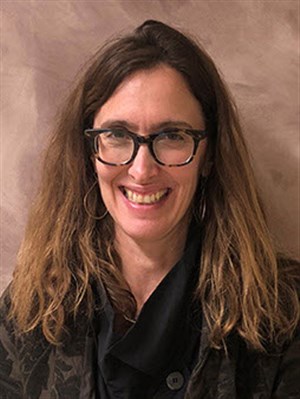
Abortion pills ‘safer than taking Tylenol,’ Plan C organization stated
An organization promoting unlimited access to pills that induce medical abortions has advertised for months on Dartmouth’s campus — but a doctor argues its claims are questionable and potentially dangerous.
Since last fall, stickers have appeared all over Dartmouth’s campus that read: “Do you need to be un-pregnant?” The stickers provide a QR code that directs them to the website of Plan C, an organization that informs the public about abortion pills and how to obtain them.
A medical abortion — as opposed to a surgical one — typically involves the ingestion of a combination of drugs that causes an implanted human embryo to detach from the uterus and be expelled from the woman’s body, according to the Louisiana Department of Health. This ends the life of the embryo and ends the pregnancy.
“Abortion pills have been FDA-approved for more than 20 years,” Plan C’s website states. “They are safer than taking Tylenol.”
The organization states on its website that its mission is to normalize “the self-directed option of abortion pills by mail.” It states it envisions a “near future in which the ability to end an early pregnancy is directly in the hands of anyone who needs it.”
The organization endorses “self-managed” abortions, meaning “you find the pills without consulting a medical professional. You then use them at home.” Plan C describes this method as “very safe.”
 However, under “What can I expect after taking abortion pills?” in Plan C’s FAQs, the site mentioned “common side effects are feeling sick to your stomach, throwing up, diarrhea, headache, dizziness.”
However, under “What can I expect after taking abortion pills?” in Plan C’s FAQs, the site mentioned “common side effects are feeling sick to your stomach, throwing up, diarrhea, headache, dizziness.”
Dr. Carrie Mendoza, the medical director at the Foundation Against Intolerance and Racism and an emergency medicine physician in Chicago, is concerned about what she termed “medically questionable” claims on Plan C’s website.
“Plan C Pill’s claim that abortion pills are ‘safer than taking Tylenol’ is misleading and potentially dangerous,” Mendoza told The College Fix via email. “Tylenol taken as directed is safe to reduce pain or fever while an overdose can cause liver damage. Conversely, abortion pills taken at home induce bleeding and pain that may be severe and result in Emergency Department visits when taken without the guidance of a physician.”
Other sections on the website give instructions for getting around state laws where abortion pills are illegal by “mail forwarding” the pills. However federal law prohibits mailing abortion drugs, according to the Heritage Foundation.
Plan C is funded by individuals, as well as organizations, such as Argosy Foundation, The Prentice Family Foundation, Kahle/Austin Foundation, and the Open Society Foundation, founded by George Soros, according to to its website. The group states its a nonprofit under the “fiscal sponsorship of the National Women’s Health Network.”
Plan C also has a lengthy disclaimer on its site which states, “This is not legal or medical advice and does not substitute for the representation of an attorney or the advice of a medical provider.” According to this disclaimer, Plan C “does not endorse the services listed in our Guide to Finding Pills.”
Plan C did not respond to two February requests from The Fix for comment.
Medical doctor called ‘Plan C’ claims ‘medically questionable’
 Dr. Mendoza told The Fix via email that it’s “important to consult with a physician because it’s not always obvious how far along a woman is in her pregnancy, and a doctor would be able to determine that, or she could have an ectopic pregnancy.”
Dr. Mendoza told The Fix via email that it’s “important to consult with a physician because it’s not always obvious how far along a woman is in her pregnancy, and a doctor would be able to determine that, or she could have an ectopic pregnancy.”
“It’s also important for a medical provider to be aware of her medical history and any medications she may be taking.”
Mendoza frequently treats low-income patients from the South Side of Chicago.
“I have seen what can happen firsthand with women who experience complications from abortion, such as very heavy bleeding and uncontrolled pain. Side-stepping the doctor patient relationship, as Plan C Pills suggests, can lead women to become the victim of adverse outcomes and puts them at risk,” she said.
Mendoza cautioned that “access to services is only one side of the healthcare equation, but when there are complications related to abortion, often abortion providers do not have the same standard of care….Abortion advocates need to take full responsibility for the complete health of the patient, including potential complications.”
“It’s my duty to provide the best healthcare to people, including to women from underprivileged backgrounds,” Mendoza said. “They deserve to have a relationship with a doctor who can safeguard their health. Taking abortion pills alone at home without any guidance from a medical professional is the opposite of that.”
Editor’s note: Chloe Ezzo is President of Dartmouth’s Students for Life chapter. Dr. Mendoza’s views are her own, and she is not speaking on behalf of FAIR or any of her employers.
MORE: Abortion pill mandate for California universities vetoed by Governor Brown
IMAGE: Plan C
Like The College Fix on Facebook / Follow us on Twitter






Please join the conversation about our stories on Facebook, Twitter, Instagram, Reddit, MeWe, Rumble, Gab, Minds and Gettr.